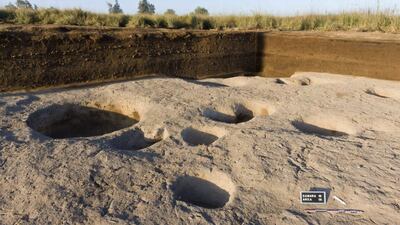One of the oldest villages in the Nile Delta has been discovered after archaeologists unearthed artefacts dating to the fifth millenium BC, Egypt's antiquities ministry has said.
Remains of the village were uncovered by a French-Egyptian team at Tel Al Samara, in northeastern Egypt, the ministry said Sunday.
Similar structures dating to the period between 4,200 BC and 2,900 BC "have never been found in that region," said Ayman Ashmawy, the ministry's antiquities chief.
The only similar discovery has been the village of Sais, in the Gharbia governorate north of Cairo, Mr Ashmawy added.
__________
Read more:
Second largest mass grave unearthed in Sri Lanka
The West’s desire for antiques has turned museums into temples of loot
British Museum to return looted antiquities to Iraq
__________
Excavations of Tel Samara, in the Dakahlia governorate northeast of the capital, uncovered a number of silos containing numerous animal bones and vegetable residue.
Archaeologists, who had been working at the site since 2015, also found pottery and stone tools at the site according to the ministry statement.
The discoveries "confirm the presence of stable communities in the humid areas of the Delta from the fifth millenium BC," said Frederic Geyau, head of the Tel Samara mission.
The findings have offered "a unique occasion to learn more about the prehistoric communities which lived in the Delta" before the Pharaonic rule, he added.
The antiquities ministry said the find indicates that humans inhabited the fertile Tel Al Samara, in the northern province of El Dakahlia, far predates Egypt's oldest known pyramid and possibly some 2,500 years before the Giza pyramids were built.
"Analysing the biological material that has been discovered will present us with a clearer view of the first communities that settled in the Delta and the origins of agriculture and farming in Egypt," said Nadia Khedr, a ministry official responsible for Egyptian, Greek and Roman antiquities on the Mediterranean.
Rain-based Neolithic farming may hold vital clues to a technological leap that led to irrigation-based farming along the Nile.
In recent years, Egypt has touted discoveries in the hopes of reviving tourism after the unrest that followed its 2011 popular uprising.

